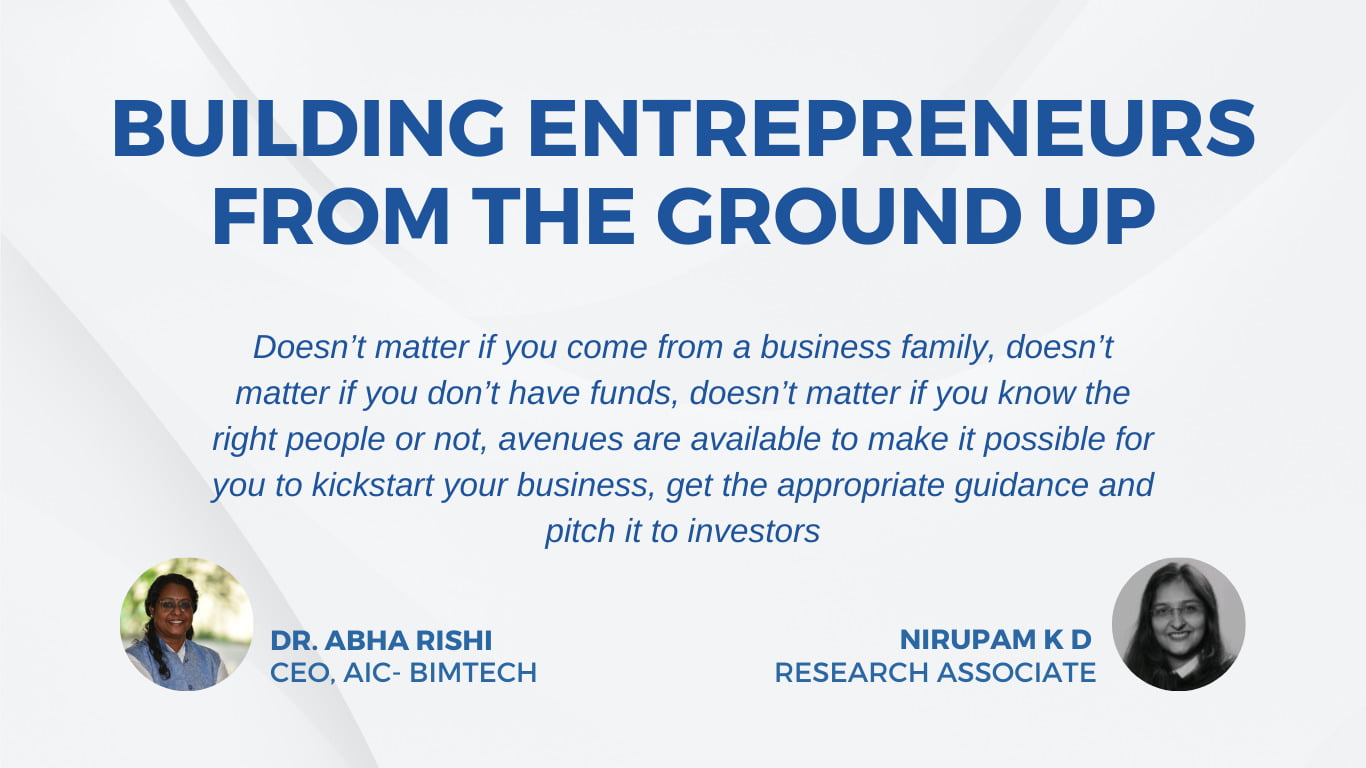
It Isn’t Out of Reach Anymore!!! Building Entrepreneurs From The Ground Up
• With a total of more than 19,500 start-ups being recognized in India in the year 2022, the total number of recognized start-ups in India has crossed the figure of 96,100 in March 2023
• Along with several central government policies, 31 out of 36 states and Union Territories have developed a dedicated start-up policy with a funding corpus ranging from INR 10,000 to INR 50 lakh per start-up,
• In India, 653 districts had at least one DPIIT recognised start-up as of 4th April 2023 (Startup India Website). By comparison, just 121 districts had at least one new start-up during the 2016–17

Start-ups, entrepreneurship, or ‘apna bijness’ as an average Indian youth likes to call it, have become the buzzwords of today’s world. If I try to remember the time when I was doing my graduation, the average student used to talk about wanting to land job placement in the company with the highest package as the end game of their education, and people even thinking of starting their own ventures was a rare case. This has visibly undergone a change with students today talking about ideas that can be commercialized, youths leaving well-paying jobs to start their own ventures, and hearing someone going entrepreneurial has become commonplace.
The growth of start-ups in India has seen an exponential rise over the past 10 years. Every second household has someone deciding to go the start-up way. With a total of more than 19,500 start-ups being recognized in India in the year 2022, the total number of recognized start-ups in India has crossed the figure of 96,100 in March 2023 (Startup India Website) India is now recognized as the third largest ecosystem for start-ups globally after US and China.
What has driven this growth? Before answering this, we should probably answer the question as to what was hindering this growth? What were the inhibitions in ‘people with ideas’ stopping them from making those ideas commerciable?
“ I have an idea, but I don’t know how to make a business out of it,” “I have a business plan, but I don’t have the funds,” “ I want to do something on my own, but I don’t know where to start” are some of the most frequent phrases that I have heard aspiring entrepreneurs make.
Initiatives like the Start-up India mission and Atal Innovation Mission have come as all-inclusive solutions to these fears and made an inherently uncertain journey a little less so. There are dedicated policies available for entrepreneurs in the technology sector, like DST- TBI and MeitY TIDE 2.0, and in the biotech sector, like DBT – Bionest. Along with several central government policies, 31 out of 36 states and Union Territories have developed a dedicated start-up policy with a funding corpus ranging from INR 10,000 to INR 50 lakh per start-up, along with provisions for the set-up of support organizations to help entrepreneurs navigate the waters muddled with emerging problems and opportunities at every turn.
The policy climate in India is such that all enabling measures have been taken to facilitate the setup and survival of new businesses. These policies look at the entrepreneurial mindset to be nurtured from the ground up and then to facilitate the growth of initiatives with the support of the entrepreneurial ecosystem at later stages. Be it Atal Tinkering Labs (ATLs) that try to engage students in innovative activities through events, and hackathons etc, be it Atal Community Innovation Centres that try to establish facilitating mechanisms at underserved regions of India or Atal Incubation Centres which provide all kinds of infrastructural as well as mentorship support facilities to budding entrepreneurs from the idea to commercialization stage, policy push towards encouraging entrepreneurship in India is comprehensive in any way.
I was recently reading a news report by ANI where in the context of their experience at an ATLs, a student is quoted saying that the ATL helped him in digital skilling, product designing, converting prototypes to products and commercializing them and that is the kind of impact these initiatives are creating at the grassroots level by giving students the opportunity to act on their ideas and create something substantial out of it.
” In India, 653 districts had at least one DPIIT recognised start-up as of 4th April 2023 (Startup India Website). By comparison, just 121 districts had at least one new start-up during the 2016–17. AICs have helped 2900+ operational start-ups so far, 900+ of which are run by women, and they have generated 32,000+ jobs throughout the ecosystem.
But what do these policy measures and these numbers actually mean for a person who wants to start their own business in today’s day and age? What it means is that guidance is available, mentorship is available, networking opportunities are available and funding avenues are also available. Doesn’t matter if you come from a business family, doesn’t matter if you don’t have funds, doesn’t matter if you know the right people or not, organizations like incubation centers, science parks, etc., have been created to make it possible for you to kickstart your business, get the appropriate guidance and pitch it to investors with actual funding opportunities if you are willing to put in the work, if you actually have the zeal to take the risk and handle the uncertainty that comes with the tag of an entrepreneur.
Supplemented with all these support structures and opportunities, there has been a clear rise in the number of start-ups coming up and new businesses being established, what remains to be seen is how many of them will be able to survive in the long term, are these initiatives also producing quality along with the quantity and will this pace of growth be sustainable over a long period of time…

